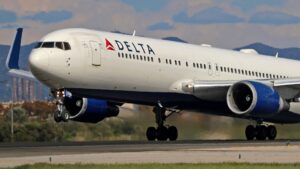The Turbulent Skies: Future Challenges for the Airline Industry
As we move into 2025, the airline industry finds itself navigating through increasingly stormy weather. From declining travel demand and government layoffs to fluctuating tariffs and consumer hesitance, several factors are pointing to potential turbulence ahead. Travelers may be prioritizing experiences, but the question remains: how sustainable is this demand in the face of economic unpredictability?
Signs of Weakness in Demand
In recent analyses, industry experts have identified significant cracks forming in the demand for air travel. This isn’t just speculation; Delta Air Lines recently revised its first-quarter forecast downwards, primarily because corporate and leisure bookings have not met expectations. Other major airlines, including American Airlines and Southwest Airlines, have made similar adjustments to their outlooks.
Savanthi Syth, an analyst at Raymond James, noted, "Clearly, things are softer than they were in January." This statement encapsulates a growing sentiment in the airline sector: consumer confidence is not what it used to be. It’s noteworthy that this comes after a robust recovery phase initiated in the wake of the COVID-19 pandemic, during which travelers flocked to international destinations. Now, signs are emerging that the party may be winding down.
Current Market Dynamics
The airline stocks have taken a substantial hit, with Delta’s share price plummeting more than 38%, American down over 45%, and United Airlines falling by more than 40% in 2025 alone. A combination of high inflation and new tariffs—reportedly as high as 10%—aimed at international trading partners, have added to investor jitters.
What does this tell us? It highlights a precarious balancing act for airlines: incentivizing premium travel while also catering to a mass market that may soon tighten its purse strings. After all, while high-income consumers have helped bolster profits in recent years, a downturn could change spending priorities drastically.
The Corporate Travel Conundrum
Interestingly, the latest downturn seems to be affecting corporate travel disproportionately. Mass layoffs in various sectors have left employees hesitant to book business trips, impacting airlines that depend on these reservations. As reported, government travel has also dried up, causing airlines to lose out on millions of dollars in revenue. This raises a crucial question for airline executives during their upcoming earnings calls: How will the loss of business travel revenue affect overall sustainability?
In this context, the airline industry is looking for signs of profitability amid changing travel dynamics. Some analysts predict that premium travel demand will still remain steady but could be stimulated further through attractive rewards programs for frequent flyers.
The Changing Consumer Landscape
Companies like the Bank of America Institute have suggested that a recent drop in consumer confidence may be causing individuals to reconsider their travel plans. Factors such as bad weather and a late Easter this year may also play a role. With consumers weighing their options between spending on experiences or goods, the decisions they make will be reflective of broader economic trends.
What Lies Ahead
As we look forward, analysts remain concerned about the competitive environment within the airline industry. TD Cowen points out that a potential shift toward slower growth and higher inflation could profoundly disrupt traditional business travel patterns. The hesitancy among Baby Boomers—a demographic that has historically contributed significantly to travel expenditures—further complicates the outlook.
As we anticipate Delta’s quarterly results—and those of its competitors—one key takeaway stands out: the airline industry is at a crossroads. While challenges loom large, opportunities to adapt and innovate exist. For instance, enticing frequent travelers through points redemption offers may serve as a viable strategy.
Conclusion: Sky’s the Limit or Downward Spiral?
The airline industry must remain agile, and companies need to pay close attention to changing consumer behaviors and economic signals. At Extreme Investor Network, we’ll continue to monitor and analyze the shifting dynamics within the travel sector, providing you with the insights you need to navigate these turbulent skies. Stay tuned for further updates and strategies to maximize your investments in this evolving landscape.
In this era of uncertainty, knowledge is your best travel companion. Don’t miss our specialized insights on the airline sector and beyond—subscribe to Extreme Investor Network today!

